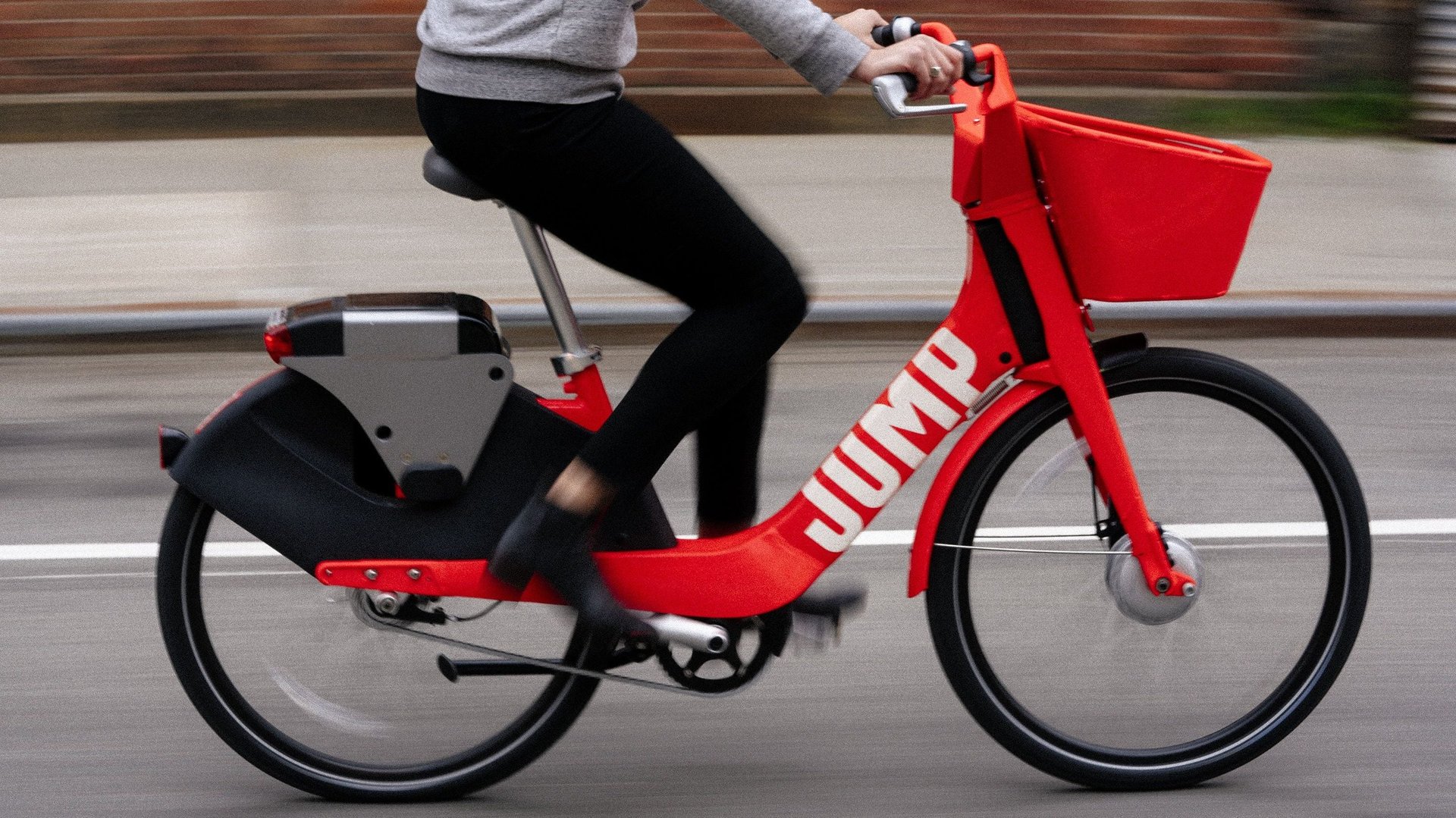This Uber-for-bikes startup is now officially part of Uber
Uber has made its first acquisition under CEO Dara Khosrowshahi: Jump Bikes, a startup that rents out shared electric dockless bikes in San Francisco and Washington DC.


Uber has made its first acquisition under CEO Dara Khosrowshahi: Jump Bikes, a startup that rents out shared electric dockless bikes in San Francisco and Washington DC.
The deal comes two months after Uber partnered with Jump in San Francisco to make bike rentals available through the Uber app. Dockless bike shares, which allow users to leave their rides just about anywhere when they’re done with a journey, have quickly become a huge business in China and are rapidly expanding into some US cities. Critics say they can cause a huge mess as broken and vandalized bikes are abandoned.
TechCrunch reports that the deal was valued at close to $200 million. Jump, which launched in 2008 as Social Bicycles, had raised about $15 million in funding. In January the company became the first in San Francisco to receive a permit for a dockless e-bike program. Jump’s team will stay “independent and focused on growth vs. integration,” with CEO Ryan Rzepecki reporting directly to Khosrowshahi, Uber’s CEO told his company in an email this morning (April 9).
In a post on Medium, Rzepecki said Khosrowshahi’s leadership made Jump feel more comfortable with the deal. “We could see the shift in the company once Dara was named CEO as he began leading with humility and in a way that we felt reflected our values,” Rzepecki wrote.
Uber has been working hard to remake its image since Khosrowshahi took over the CEO job in August 2017 from Uber co-founder Travis Kalanick, who was pushed out in a messy power struggle in June 2017. Over the last nine months, Uber rewrote its corporate values, became more conciliatory with regulators, and settled a trade secrets lawsuit with driverless car competitor Waymo.
At the same time, Uber has increased its focus on services that complement or replace public transportation. Uber began this transition under Kalanick, with the launch of car-pooling service UberPool and rebranding its slogan from being “everyone’s private driver” to “transportation as reliable as running water.”
Under Khosrowshahi, that vision has taken off. In November 2017, Uber launched Express Pool, a modified Pool service that gives customers a discount for walking to a shared pickup point, thus reducing the number of stops on the route. Express Pool bears obvious similarities to a bus, but with greater flexibility than existing public transit routes. (Via, a ride-sharing company in New York City, was already doing something similar.) In January, Uber joined a call with Zipcar, Lyft, and several bike-sharing companies urging cities to embrace their services for more sustainable transportation.
Expanding into alternative modes of transportation like bikes dovetails nicely with Uber’s need to reestablish itself as a friend of cities, rather than a foe. The company has made enemies of many local governments with its barge-in strategy over the last 10 years, and now is rarely given the benefit of the doubt. In cities including New York and Uber’s hometown of San Francisco, for example, the company faces pressure from transit experts and regulators who say ride-hailing has worsened congestion and decreased use of public transit systems.
“You’ve heard me talk a lot about Uber as a platform—using the power of our technology, our on-the-ground Ops know-how, and global scale to provide more options for multimodal transportation to help people (or stuff) get from point A to B,” Khosrowshahi wrote in the email, according to a copy reviewed by Quartz. “This also helps us provide greener, more affordable, and more accessible transportation options for commuters, ultimately reducing the need for individual car ownership.”
At the same time, the move into dockless bikes could reenforce skepticism from opponents who say un-docked bikes clutter city streets and sidewalks, and encourage theft and vandalism. Such concerns have led many large US cities to cap the number of bikes allowed or resist dockless bike-share entirely. “You drive down a street, you see bikes everywhere, all scattered out,” Dallas City Council member Tennell Atkins told the Wall Street Journal late last month. “We’ve got to think it through. It’s a mess.”
Read Khosrowshahi’s full email to Uber staff below:
Team Uber:
I’m excited to share the news that we’ve entered into an agreement to acquire JUMP Bikes, an electric, dockless bikesharing service we’ve already been partnering with in San Francisco.
You’ve heard me talk a lot about Uber as a platform—using the power of our technology, our on-the-ground Ops know-how, and global scale to provide more options for multimodal transportation to help people (or stuff) get from point A to B. This also helps us provide greener, more affordable, and more accessible transportation options for commuters, ultimately reducing the need for individual car ownership. Our pilot of JUMP bikes in San Francisco is off to a very strong start, with thousands of trips by riders who always have smiles on their faces as they cruise up hills—and past people riding conventional bikes – I almost felt guilty riding mine. Almost :-).
I also wanted to say a few words about Ryan Rzepecki, JUMP’s CEO: Ryan has spent the last nine years on this journey, is a terrific entrepreneur, and he’s thrilled to bring JUMP’s bikes onto the Uber platform. Ryan will report to me, and we will look to keep the JUMP team independent and focused on growth vs integration in the near to mid-term. We will of course look to our many teams to help JUMP scale in our uniquely Uber way!
I look forward to introducing Ryan and his team soon at a company All Hands.
JUMP on!Dara
The Quartz push team contributed reporting.